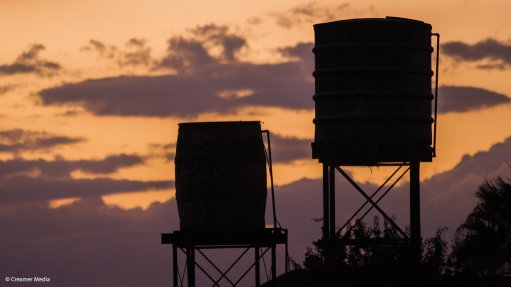
Photo by: Creamer Media
The Northern Cape has been exposed as having the country’s poorest drinking water quality, casting further doubt on the province’s prospects of ensuring a sustainable supply of clean water in the Northern Cape, in the near future.
The volatility of the Northern Cape water situation came to light during last week’s National Council of Provinces Week in the Namaqua and ZF Mgcawu districts and has prompted the Democratic Alliance (DA) to push for the establishment of a provincial task team, inclusive of a broad range of stakeholders, including political parties, to oversee water security in the Northern Cape.
Of particular concern is that the Northern Cape comes in with the country’s worst ratings on the blue drop programme, at only 79,9%. This is in comparison to all other eight provinces, whose ratings are in the 90’s.
Concerns about water quality are not new to this province.
For months already, many Sol Plaatje residents have been complaining of dirty water coming through their taps. In Kai !Garib, muddy, fishy-smelling water was previously reported to be flowing through people’s taps and it has subsequently been confirmed that the Water Treatment Plant is in a bad state due to ageing infrastructure and lack of maintenance. There are many other similar cases.
In addition, increasing cases of water contamination are being exposed. The provincial health department’s second quarterly report for 2021/22, indicates that they picked up 122 non-compliant water samples from July to September last year alone.
According to the Department of Water and Sanitation (DWS), in terms of water service infrastructure grants, the Northern Cape has 25 projects, which the department of water and sanitation is implementing in order to provide basic water and sanitation supply. Very worrying however, has been the significant under-expenditure on water related projects funded by the Municipal Infrastructure Grant (MIG), with poor project management causing many projects to be stopped. For example, as end of February this year, Richtersveld had spent 0% of its R14 million allocation.
We cannot afford such a sluggish approach to water infrastructure maintenance and upgrades.
I have written to the DWS to ask that an inter-sectoral task team be set up to ensure comprehensive and real-time oversight of water quality, infrastructure and project expenditure.
We are running out of clean water at a scary rate. It is therefore critical that, going forwards, every drop of water and every cent allocated towards water security, must be closely guarded.
Issued by DA Member of the NCOP, Delmaine Christians MP
![]()